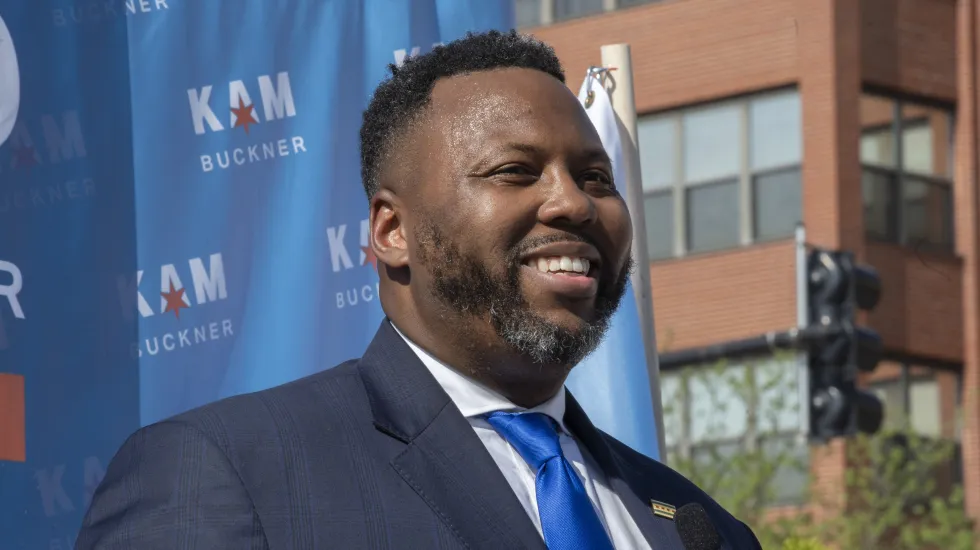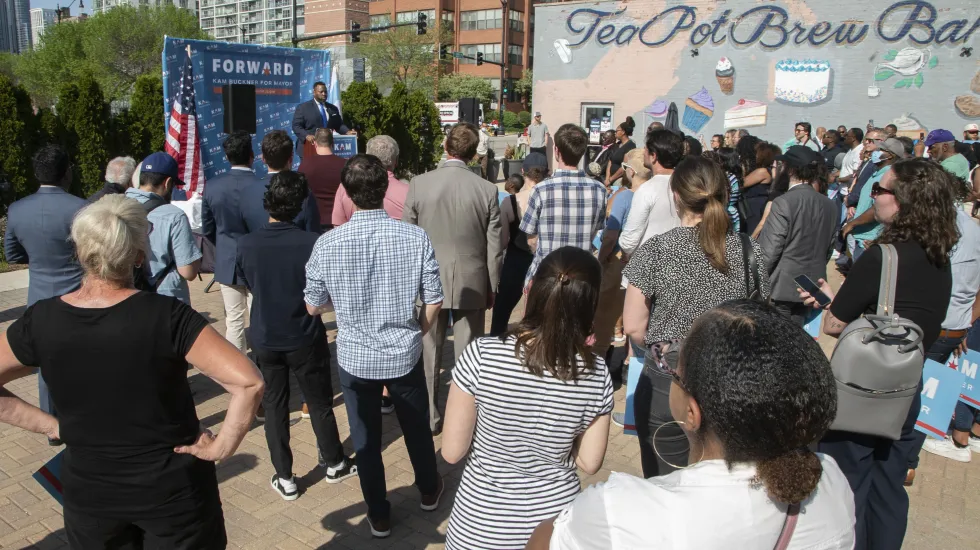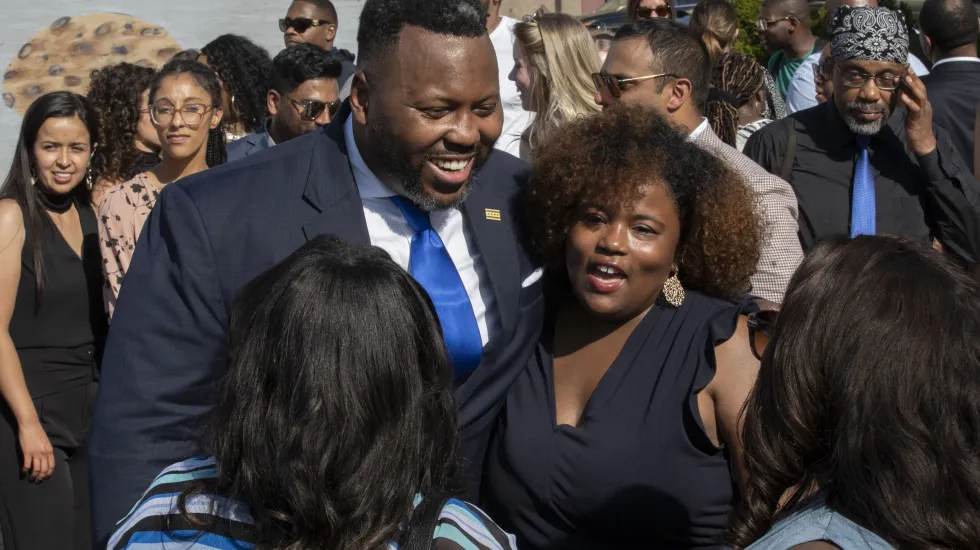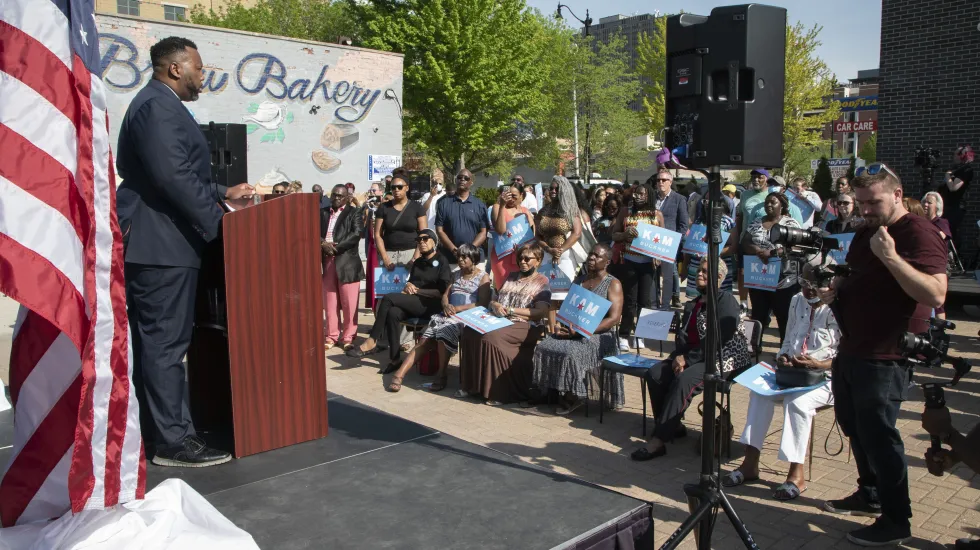
The race for Chicago mayor became slightly more crowded Thursday with state Rep. Kam Buckner declaring he will look to unseat Mayor Lori Lightfoot from City Hall’s fifth floor in the upcoming 2023 election.
“I love this city, I am from this city, I decided to remain in this city and raise my family here,” the South Side Democrat said ahead of his campaign announcement. “It is very clear that people don’t feel safe, they don’t feel seen and they don’t feel like there is a plan to address those things.”
The chairman of the Black Caucus in the Illinois House of Representatives said his campaign will focus on instilling trust in city government and making tangible changes to some of the most pressing issues facing residents — such as improving Chicago Public Schools and reducing a surge in violent crime.
“We have gone through the last two or three years with strikes, COVID and all the other things wrapped in that,” Buckner said. “We have put our young people in a real bad position, and we are not giving them the resources.”
For weeks, Buckner has been critical of Lightfoot’s tenure as mayor but held off on declaring his intent to run until after the spring session of the Illinois General Assembly, which ended early in April.
He was greeted with cheers and applause from about 50 people Thursday afternoon as he walked to a podium set up outside TeaPotBrew Bakery, 1802 S. Wabash Ave., on the Near South Side to kick off his campaign. The crowd included his mother, a longtime CPS teacher.

As a son of an educator and a Cook County law enforcement officer, Buckner said he was taught “the values of safety, justice and education.”
“They taught me that the highest calling is serving others, keeping your community safe, enhancing their knowledge while expanding your horizons,” Buckner said. “We need a mayor who can bring people together to get things done for Chicago.”
Buckner told the Chicago Sun-Times in March that Lightfoot “has a personality that a lot of folks don’t like” — a personality that created barriers to solving some of the city’s most pressing issues.
He admitted the built-up friction in City Hall isn’t only the mayor’s fault, but he insisted Lightfoot has an obligation to try to bring everyone together to make progress on important issues.
Buckner is a South Side native. His legislative district sits within the city limits and takes in parts of the Gold Coast, Bronzeville, Grand Boulevard, Hyde Park, Kenwood, Oakland, South Loop, South Shore, Streeterville and Woodlawn.
A football player at Morgan Park High School, he was once one of Chicago’s top defensive end prospects and was recruited to play at the University of Illinois in 2003. After graduation, he became an aide to U.S. Sen. Dick Durbin, D-Ill., and returned to Chicago, earning his law degree from DePaul University.

Since being elected to the Legislature in 2019, Buckner was one of the driving forces behind a sweeping criminal justice reform bill that eliminates cash bail. He also pushed for an elected Chicago Public Schools board.
Buckner has previously called for a need to “press the reset button” between CPS and the Chicago Teachers Union in order to find some common ground. The relationship between the union and the school district, historically shaky, has become even more strained during the pandemic over issues including how and when teachers return to the classroom.
Buckner has been a close ally of the CTU and is the son and brother of CTU members. He said at his campaign rally that he would personally negotiate the next CTU contract and wouldn’t send a “proxy” in his place.
More recently, Buckner criticized Lightfoot for leaving a Board of Education seat empty for nine months, saying at the time that “it’s hard for me to understand why it would be so hard to fill a role like that with a person who is committed to representing young people.”
He has long been an outspoken advocate for criminal justice reform and recently introduced a bill that would make the transfer, purchase, manufacturing, importation or possession of a ghost gun illegal. The bill would essentially require serial numbers for all firearms, including those created with 3D printers.
The city, he said, faces a real crime problem. Residents don’t feel safe and “they are nervous to stop for gas or taking their dog for a walk,” he said, though he cautioned that addressing crime also requires understanding the “context” of conditions that lead to crime in some communities.

Buckner said his balanced approach to public safety would happen through “vastly increasing” the city’s gun violence prevention budget, investing in anti-violence organizations, helping push through gun reform and “a robust mental health responder model.”
Buckner’s past personal decisions also may be brought up by opponents, such as his 2019 arrest for driving under the influence, which he said he would have a “direct conversation with the people of Chicago” about.
Last month, Ald. Ray Lopez (15th) announced he would relinquish his City Council seat to challenge Lightfoot. Lopez has taken a tough-on-crime approach in order to “save Chicago” from rampant violence and pledged to fire Chicago Police Supt. David Brown immediately.
Millionaire businessman Willie Wilson also is running, hoping to leverage goodwill from his recent gas giveaways and continued philanthropic efforts in Chicago.
Buckner is starting his campaign with $173,813 in his state representative campaign fund that can be used for his mayoral campaign. The money is largely from union donors. a point of pride for the candidate.
How he plans to gather small donations from everyday Chicagoans to compete with the coffers of Lightfoot and self-funded Wilson remains to be seen.
“I don’t have $5 million I can lend to my campaign but this city is filled with people who can get involved with this campaign and I am excited to have that conversation with Chicagoans,” Buckner said.
Among the high-profile potential candidates who have decided to pass up the race are U.S. Rep. Mike Quigley, D-Ill., and Arne Duncan, a former U.S. education secretary who also once was CEO of CPS.







